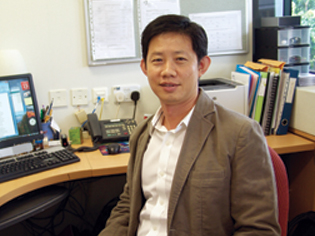Young Children’s Voices in Mathematical Problem Solving
Contributed by Dr Ho Siew Yin and Sng Wei Qin Abbie, from NTUC First Campus, for SingTeach Virtual […]
Read More
In science learning, we have to seize every opportunity to let our students discover and make meaning of scientific concepts collaboratively. Learning science is now made easier with the increasing opportunities for social interaction offered by modern technology.
The advent of technology brings about many possibilities for us to facilitate collaborative science learning environments. Computer-supported collaborative learning (CSCL) technology is one promising way to support the process of collaborative investigative discussion.
Associate Professor Tan Seng Chee, Head of the Learning Sciences and Technologies Academic Group at NIE, believes a knowledge-building community is fundamental to achieving meaningful science learning. He has been actively involved in the application of CSCL tools to support knowledge building in science classrooms.
Comparing this to a community of scientists, Seng Chee notes that there are two key objectives of such communities. The first is to develop the habit of inquiry among its participants.

“In other words, we want to motivate our students to ask questions in their attempt to understand the things around them, find out more information to answer their questions, and discuss their understanding with peers,” he explains.
The second goal is to create opportunities for epistemic discussions. “What I mean is the ability to engage in meaning making, in assessing the value of an idea, in combining ideas to synthesize better explanations. This is different from social chats or searching the Internet for answers to merely complete a worksheet.”
To create a knowledge-building community for science students, Seng Chee uses an asynchronous online discussion forum called Knowledge Forum.
“It is a forum specifically developed to support knowledge-building pedagogy, which focuses on getting students to discuss and deepen their understanding about a particular science phenomenon.”
Science laboratory activities act as a trigger for students to build their knowledge online. For example, for the topic on “energy”, students are asked to light a candle with a spiral hanging above the candle which spins as the candle is lit.
The teacher then spends time pulling knowledge together with the students before asking them to go online to illustrate their ideas and observations with graphics. To make sure students stay on track with their learning, teachers provide scaffolds to guide them.
Using Knowledge Forum, the students’ inputs are made visible to their classmates. The online interactions help deepen their understanding of the science topics.
Seng Chee admits that the use of such a forum raises questions like: “Why do we need to use a discussion forum? Why can’t students just meet and discuss?”
– Tan Seng Chee, Learning Sciences and Technologies Academic Group
In response, he says that technology acts not just as a platform for discussion. “In posting a note in a discussion forum, it requires a student to articulate their thoughts in the form of text or diagrams. By doing so, their ideas are ‘captured’.”
“We have tried the process without using Knowledge Forum, by asking students to post their ideas using post-it notes. We soon ran into the issue of where to keep the post-it pads so that there is a continuity of discussion between lessons,” Seng Chee says.
The Knowledge Forum also highlights the value in meaning making through both classroom talk and online discussions.
“Our research introduces a pedagogy that engages students in collaborative meaning making and idea improvement. At the same time, we also develop their motivation and knowledge-building activity to pursue deep understanding of a topic,” he explains.
Even though technology can easily enhance both the learning and teaching processes, it is crucial not to overlook the role played by teachers.
As the culture of Internet chats and mobile messages is so deeply entrenched in students, the scaffolds provided by teachers on the online forum greatly reduce the tendency of students to engage in social chats.
To fully leverage on the affordances of technology, teachers must first possess sufficient in-depth knowledge about a topic, know how students can learn that topic, and understand how technology and teachers themselves can further support students’ learning process.
Seng Chee’s research has found that the type of inquiry tasks set by a teacher could influence students’ questioning behaviours in an online forum.
“Since questioning is an important part of inquiry, teachers could use the findings from the research to guide them in the designing of inquiry tasks so as to maximize the possibility of achieving intended learning outcomes.”
CSCL enables students to engage in collaborative work and discussion while providing a record of the development of ideas. “Our experience underscores a few important roles of technology – to capture students’ ideas, to make the ideas public, and to allow the students to improve on the ideas and organize them,” says Seng Chee.
“Another important element lies in evaluation,” he adds, referring to the need to assess the learning process. “As a teacher, I must know how my students learn and whether they are learning well. To do that, I need to identify the relevant indicators about the learning process. Listening to student talk is important; it reveals a lot about their thinking and learning.”
With a little help from technology, science students can build their scientific understanding and investigative skills through active inquiry, both on their own as well as with their friends and teachers.